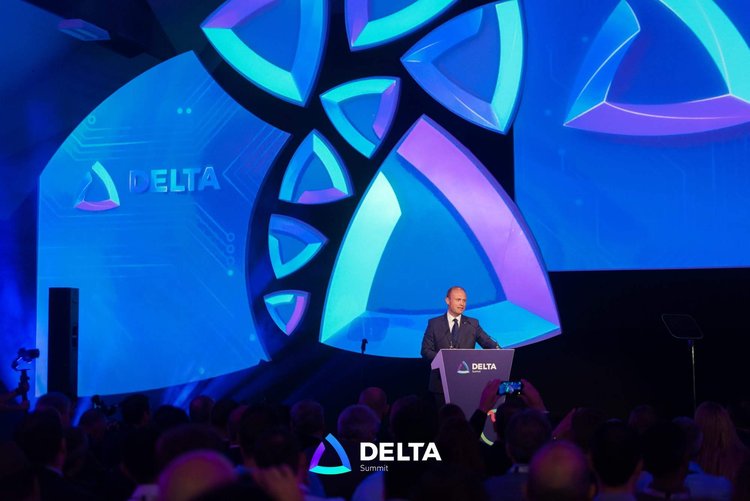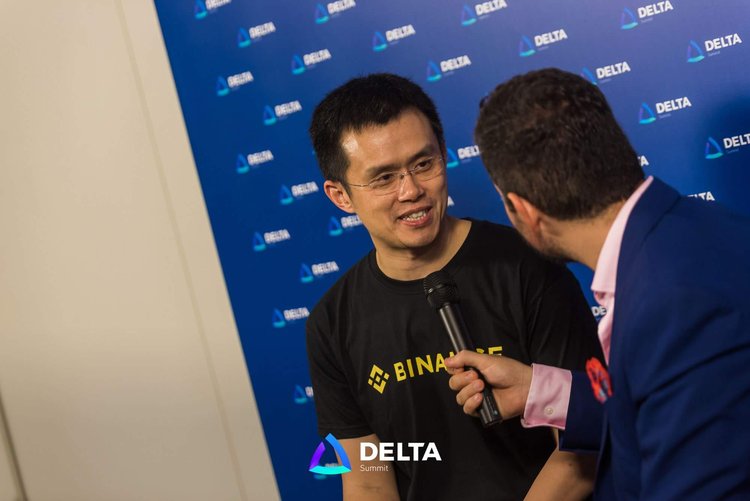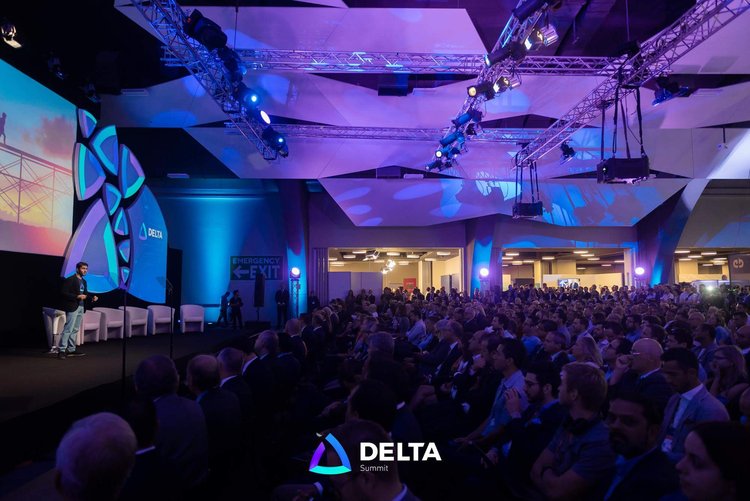The first edition of Delta Summit was held in Malta from October 3rd to 5th. The event focused on blockchain industry and was officially supported by the Maltese government, which unsurprisingly attracted a crowd of more than 4,000 attendees from all around the globe.
A number of policy makers, entrepreneurs, influencers and companies shared the stage, addressing topics going from market regulation to tech innovation. Here are the key points to take away from the event:
Blockchain Island:
Abdalla Kablan, Fintech expert, lecturer at the University of Malta and executive chairman of Delta Summit, said that the event was “designated to celebrate Malta as a regulated virtual currency and ICO centre”, while Maltese Prime Minister Joseph Muscat described it as “the most important meeting of its kind ever held in the world”.
“In all corners of the world, blockchain is now associated to another word. That word is Malta”, Muscat declared in his opening remark, a week after stating that crypto are “the inevitable future of money”.
Silvio Schembri, Junior Minister for Financial Services, Digital Economy and Innovation, expanded those points: “We started out a series of discussions, be it with stakeholders, businesses, interested parties, authorities, regulators... to get a clear idea on what is lacking in this sector. And it was clear that the industry was crying out loud for sensible regulation. Regulation which offer integrity, consumer protection, market protection and financial stability, but at the same time without stopping innovation. [...] And it has been achieved in such a short span of time”.
Furthermore, Schembri said that Malta’s achievements will serve as a blueprint for other countries, announcing in the process the official launch of the Malta Digital Innovation Authority (MDIA), that will manage the organization of innovative technologies, like blockchain and cryptocurrencies.
Both Muscat and Schembri were eager to point out that Malta’s ambitions were not confined to the blockchain sector, but will reach “Artificial Intelligence, Internet of Things, quantum computing, Big Data and space”.
Opportunities:
The intersection of politics and new technologies was emphasized by several speakers.
Roberto Viola, General Director of DG Connect at the European Commission, reminded everybody that European Union institutions are part of this conversation as well. “Blockchain may not be the panacea that will resolve all our challenges. But it is an opportunity that we cannot overlook. An opportunity for EU businesses to lead in new trusted business models, for public services to deliver better, more innovative trusted services to our citizens”, said Viola in his introductory video message.
Venture Capitalist Tim Draper, famous for coining the term “viral marketing” and for his bullish stance on crypto, talked about Malta’s legislation and pictured a scenario where “government can be virtualized”, thanks to blockchain and smart contracts: “If they start to think about the government virtually, they could have a billion virtual Maltese [citizens], and that could change everything, they could compete with Estonians, Singaporeans for us, for us the people of the Earth. We now can choose the the government that is right for us”.
This sentiment was echoed by Nigel Green, founder and CEO of deVere Group, an international financial consultancy firm. “People across the world are increasingly looking for alternatives to fiat money, traditional financial services, and centralised agencies and governments. And this sector answers that demand”, Green said. He also noted that “cryptocurrency and blockchain sector must now actively call out crypto demagogues, do more to prove crypto cynics wrong, and push for regulation”, while he also attacked Donald Trump’s economic policies and Warren Buffet’s bitcoin skepticism.
The power and importance of global adoption of cryptocurrencies as a mean of “economic freedom” was stressed out by Roger Ver, early investor in bitcoin ecosystem and one of the major advocates of bitcoin cash.
And Larry Sanger, co-founder of Wikipedia, talked about knowledge and education, introducing his new project Everipedia, an encyclopedia built on EOS. Its mission is to “move beyond Wikipedia just as we moved beyond Britannica almost two decades ago”, according to Sanger.
Crypto exchanges and security tokens:
Representatives of world leading crypto exchanges roamed the Delta Summit and the packed venue hosted various stands showing off the big names such as Binance, ZB and OKEx (all three found a new operating base in Malta).
One of the most anticipated speakers, Changpeng Zhao, CEO of Binance, said that what made the Maltese government stand out among its peers was that it “understands technology” and that, by the time of his first trip to Malta, “already had a draft regulation” that Schembri’s team sent Binance for comments.
This approach laid the ground for a partnership with Malta Stock Exchange that yielded a couple of projects, both still at the developing stage: a centralized stock market for security tokens and a decentralized security token trading platform. The latter “is actually the future” of financial transactions, according to CZ, and sees the participation of German blockchain startup Neufund.
Then the 41 year old Chinese/Canadian talked about Binance’s involvement in Founders Bank as a minority investor. Founders Bank was outlined as an “extremely pro-crypto blockchain-based bank”, “specifically targeted at new startups founders of businesses”.
Updates were also given regarding the state of first Binance’s crypto-to-fiat (euro) exchange operations in Malta. “We had a few beta transactions already”, Zhao said.
But, as stated before, Binance was not the only high profile player on the scene.
Other guests called for better standards in the field of crypto exchanges (where vulnerabilities to cyber attacks, lack of insurances for the users and accusation of wash trading are not that rare).
Calvin Cheng, co-founder and CEO of ABCC Digital Asset Exchange, focused on the “difference between exchanges that are gonna persist and those that will be eliminated”: it will be “trust and credibility”.
In order to attain this kind of status in the industry, companies cannot afford to avoid having a back and forth debate of “contentious points” with regulators “especially at the European level”, according to David Pulis, co-founder and CEO of ZBX, the soon to be launched European operation of Chinese giant ZB.COM, one of the biggest exchanges in terms of traded volume. “That opens a whole Pandora’s box of problems. But this is why the times are exciting. We are going to figure out how to do these things,” Pulis said.
Fellow panelist Daniel Skowronski, CEO of DX Exchange, a zero fee crypto-trading platform based on Nasdaq technology that holds an Estonian license, identified the widespread lack of “custodianship, regulation and insurance” as the three missing pieces in the current landscape, thus preventing institutional investors from entering the cryptocurrency market.
Skowronski also announced an expansion in DX’s line of products: “We have plans to launch our own security token exchange. It is gonna be called DXS, we are gonna receive a MTF license, which is a EU regulated MiFID license. That can be hopefully launched in Q1 of next year”.
Security tokens were actually one of the leitmotifs at Delta Summit. Many experts suggested that these assets could represent the next step in the evolution and maturation process of both cryptocurrency market and financial services.
One of the major proponents of the so-called “tokenization of economy” is surely Neufund, a Berlin-based project, whose blockchain platform allows companies to issue tokens to represent a part of their equity and then conduct Equity Token Offerings (ETOs), as a sort of middle ground between VC rounds, IPOs and ICOs.
Now Neufund is working with Binance and MSX (the tech branch of Malta Stock Exchange) to set up a decentralized platform specialized in security tokens trading.
“The market cap of security tokens is projected by some to reach $1 - 10 trillion by 2020”, Neufund CEO Zoe Adamovicz commented. And then she told the audience: “Wall Street wants blockchain and Wall Street needs blockchain. But does blockchain need Wall Street?... What if all securities are tokenized?”.
Relationship with banks:
Arising tension between traditional financial institutions and blockchain sector was broadly discussed on and off the Delta Summit’s stage as well.
In the eyes of Edward Scicluna, Maltese Minister of Finance, the disruptive impact of blockchain technology and cryptocurrencies will eventually cut the finance middlemen off, as reported in an interview for Cointelegraph.
Gregory Klumlov, CEO of Stasis, the company behind the EURS stablecoin, shared his views on the biggest challenges blockchain startups are facing, regarding their access to banking services: “Banks are competitors to features and functionality that DLTs offer. So it is natural for them to resist. Plus, in a negative interest rates environment, they have a very limited business model left. So that’s why they charge upfront commissions when you try to set up a corporate account and charge literally tens of thousand euros just to start working with you”.
The same problematic relationship between banking sector and crypto/blockchain world mentioned by Roderick Psaila, former CEO of AgriBank, but this time tackling it from the retail customers’ perspective. In fact Psaila predicted that “two or three new banks will open in Malta within the next year”, fully embracing “blockchain technology and cryptocurrencies” and eventually establishing a dominant position in this market segment.
As a final point, Dimitris Litsikanis of Revolut, a digital banking startup that supports 6 cryptocurrencies and 25 fiat currencies, showed a glimpse of what may come: Litsikanis revealed that Revolut, which operates in over 140 countries, had its biggest market level penetration in Malta, where 35.000 people (almost 10% of the population) signed up in less than one month after the company made its service available on the island.





